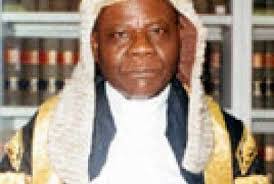By the time you are done reading this piece by Olanrewaju Onigegewura , you would have read in a beautiful story style, the case of MISS CHINYE A.M. EZEANAH V. ALHAJI MAHMOUD I. ATTA (2004) 7 NWLR (Pt. 873)468).
“When my love swears that she is made of truth,I do believe her, though I know she lies,That she might think me some untutor’d youth,Unskillful in the world’s false forgeries”-
William Shakespeare, The Passionate Pilgrim
When the Banker met the Maiden in the early 1990s, it was love at first sight, at least on the part of the banker. Mahmoud Attah was the Banker. Chinye Ezeanah was the Maiden. Attah was however not just an ordinary banker. He was a super banker. In fact, he was the chairman of one of the biggest banks in Nigeria at the time.
Chinye was as beautiful as she was elegant. She was described by one of the witnesses as ‘fine and charming’. Theirs was a story described by the Supreme Court as a story of so much love and so much pain. But at the time, neither Attah nor Chinye knew that what started as love at first sight would end up in court as a landmark case.
It was not exactly clear when they met. The chairman claimed they met in 1991. Chinye claimed it was in 1993. According to her, it was at her younger sister’s boyfriend’s house that they met and it was in January 1993. The chairman saw the beautiful lady who was ‘fine and charming’ and became besotted. He asked her to be his girlfriend. Chinye refused on that day. The chairman however refused to take no for an answer.
They went on as father and daughter. The chairman became the guardian. The maiden became his ward. With time, Chinye agreed to become his girlfriend. Attah must have been elated. He lavished love and money on the object of his affection. He rented an apartment for her in Maitama, Abuja. At the time when telephone was the exclusive preserve of the rich and a status symbol, the apartment had an installed telephone, courtesy of Alhaji Attah.
To ensure that the love of his life lacked nothing, Attah dedicated a protocol liaison officer of the bank where he was chairman to her. He introduced Chinye to the officer as his fiancée. It was the responsibility of the officer to run errands on behalf of the chairman for the maiden. These errands included sending the maiden money to settle her bills and other sundry assignments.
There was however a small problem. Attah was already married. His family got wind of the relationship between him and Chinye. Naturally they were not happy. Chinye’s family was also not particularly excited. Her mother specifically wanted to know the direction the relationship was going.
It was at this point that Chinye broached the issue of marriage with her lover and benefactor. Attah was however not ready to formally marry her. According to her, “on several occasions I raise it [issue of marriage] he would say he had problems as to his sperm count. He went on telling me that he would encourage me to get a husband and that he would sponsor the marriage.”
With pressure coming from his family, Attah decided to send his love to England for further studies. Of course, Alhaji Attah was not a stranger to Her Majesty’s country. He had a house in London. He also had other businesses there. His last son, at that time, was also in London. This was coupled with the fact that the bank of which he was the chairman also had a branch in the United Kingdom. Chinye therefore left for London, courtesy of her mentor who also visited her often.
If that was all, perhaps you would not be sitting down today scrolling down your device to read this story. Perhaps, Onigegewura would have been writing about another incident. Perhaps, there would not have been any story to write in the first place. Perhaps…
As it happened, Chinye applied for land allocation in the Federal Capital Territory. She paid the prescribed fee of N300. In the early ‘90s, N300 was a princely sum. The payment was made in 1993. It was however not the signature of Chinye that was on the portion meant for signature of applicant. It was the name of Alhaji Attah and his signature. It was however stated on the form that he signed for Miss Chinye. Thus, the name of Alhaji Attah appeared above that of Chinye. I hope you understand.
When a new Minister was appointed for the Federal Capital Territory, he introduced additional fee of N6,700. This payment was also made by Chinye and she was issued receipts for the two sums paid. The two receipts were in her name. With payment completed and with Chinye being out of the country, Alhaji Attah began to follow up on the processing of the file.
Finally, the certificate of occupancy in respect of the land was ready. Since Alhaji Attah was the person known to the authorities as being the one facilitating the processing of the file, the certificate was sent to him. In turn, Attah sent a copy of the certificate to his lover through her sister. Everybody was happy.
With the support of Attah, Chinye successfully completed her study in the United Kingdom and returned to Nigeria in 1997.
In April 1999, Attah was shocked to the marrows when he learnt that his lover and girlfriend had secretly gotten married, not to him but to another person. Attah thought it was an expensive April fool’s joke. He conducted a discreet investigation and he found out that it was actually true. In fact, the marriage had been contracted a year earlier in 1998.
Chinye must have assumed that Attah would be pleased with her decision to get married. After all, he had told her to get a husband and that he would sponsor the wedding. She therefore went to her former lover to get the certificate of occupancy in respect of her prime property. It was however the turn of Chinye to be shocked when Attah informed her that the land was gotten for her on the condition that she would marry him. Having breached the promise to him, she was no longer entitled to the land.
That was not all. Chinye also learnt that Attah was trying to alter the name on the certificate of occupancy. It therefore became apparent to her that the chairman was determined not to release the land and the certificate of occupancy to her. Her fears were soon confirmed when she visited the property in question and saw a building being erected on the land. She did the most natural and legal thing. She went to court.

In court, her case was pretty straightforward. She was the owner of the land. Application for the land was made in her name. Receipts for the payments were issued in her name. The land was allocated to her. There was no agreement to marry her lover who had in fact encouraged her to look for another man to marry.
To her surprise, the chairman maintained his ground that they both agreed to get married and that it was based on this marriage contract that Attah sponsored her for further studies in England, paid all the school fees and supported her throughout her stay until she returned to Nigeria in 1997. That was not all. The chairman also claimed to have incorporated companies and got allocation of shops and plots of land as well as set up business ventures for her, all in furtherance of the marriage agreement.
To support his case and to prove that Chinye agreed to marry him, the chairman called three witnesses. The first witness was a builder who testified that Chinye once met him and introduced herself as the proposed wife of the man the builder was working for at Minister’s Hill. He also testified that Chinye used to visit the site in dispute to effect some corrections and that in fact she visited the site more than seven times.
The second witness was the liaison officer Onigegewura had earlier told you about. According to him, it was Attah who introduced Chinye to him as his fiancée. The third witness was a member of staff of Federal Capital Development Authority who claimed not to know Chinye but only treated the file bearing her name.
Lest I forget, the chairman did not only defend the case, he also counter-claimed against the young lady. When someone sues you and you also sue the person in the same case, that is counter-claim. In the counter-claim, the chairman asked the court to declare that he was the owner of the property notwithstanding the fact that it was Chinye’s name that appeared on the certificate of occupancy.

The task before the court was therefore to determine who was the owner of the property in dispute. The High Court of the Federal Capital Territory considered the case of both parties carefully. After listening to all the witnesses and reviewing all the documents filed by both the chairman and the lady, My Lord Honourable Justice Kusherki of the High Court of the Federal Capital Territory found in favour of Chinye. The Court upheld her claims and dismissed the counter-claim of the chairman. His Lordship went further to direct Chinye “to take possession of both the plot of land… and certificate of occupancy.”
In her case before the court, Chinye had also asked to be awarded the sum of N2,000,000 as general damages for trespass on the land. The court however refused to grant this claim.
The chairman was displeased with the judgment, naturally. He appealed to the Court of Appeal. My Lords on the panel were Justices Dahiru Musdapher, Zainab Bulkachuwa and Albert Oduyemi. His Lordship Musdapher presided and read the judgment of the court. Contrary to the findings of the court of trial, the appellate court held that the chairman was the owner of the property in dispute notwithstanding Chinye’s name on the certificate of occupancy.
The court further found that the conditions of the gift of the land to Chinye having failed, she no longer had legal or equitable right to the property. Judgment was therefore entered in favour of the chairman.
It was now the turn of Chinye to be displeased with the judgment. She filed an appealed to the Supreme Court. As you know, that is the apex and final court of appeal.
 At the Supreme Court, Chinye was represented by a firebrand attorney, Mrs. J. O. Adeshina. The learned counsel argued that the finding of the Court of Appeal that the property was acquired by the chairman in furtherance of a marriage agreement was not supported by evidence and the facts before the court.
At the Supreme Court, Chinye was represented by a firebrand attorney, Mrs. J. O. Adeshina. The learned counsel argued that the finding of the Court of Appeal that the property was acquired by the chairman in furtherance of a marriage agreement was not supported by evidence and the facts before the court.
The chairman, on the other hand, was represented by another brilliant counsel, Mr. O. A. R. Ogunde, who appeared with two other counsel. Mr. Ogunde argued that the Court of Appeal was right because the court found that the chairman paid all the fees for the allocation of the plot and signed the application form and that all these were done in furtherance of a marriage agreement between the parties. He submitted that as a result, Chinye was a resulting trustee of the property and not the absolute owner.
In case you don’t know what a resulting trustee is, let me attempt to explain it. It is also called implied trust. Let me illustrate it with this example. Ajangbadi purchases a property in the name of Okokomaiko. In the absence of any explanation to the contrary, equity presumes that Okokomaiko is holding the property in trust for Ajangbadi. In other words, the learned counsel argued that Chinye was holding the property in trust for the chairman. I hope you now understand. You do? Very good.
My Lord Justice Niki Tobi who read the lead judgment looked very carefully through the records of proceeding. His Lordship was trying to find evidence of the agreement for marriage between the chairman and the young lady. This was important because it was the agreement that the chairman claimed to have made him to procure the landed property in dispute.

His Lordship however was unable to find any agreement. The only thing the Honourable Mr. Justice Tobi found was the evidence of Chinye who testified that the chairman “refused to go and see my parents on the gifts and offers.” By the way, the chairman didn’t personally testify. [In law, it is not mandatory for a party to personally testify as a witness, provided that she has other witnesses.]
The Supreme Court found that there was no evidence to contradict Chinye’s testimony, particularly in respect of the chairman’s refusal to go and see her parents. The apex Court was therefore of the view that: “it is difficult to come to the conclusion that there was really an agreement to marry; not to talk of such an agreement based on the putting of the property in dispute.”
Four other Honourable Justices sat with Justice Niki Tobi to hear the case. They also examined the records of proceedings with magnifying glasses. Their Lordships were unable to find any evidence of agreement for marriage. What they found was that it was the young lady’s name that appeared on the title documents of the land. Even in the forms where the chairman’s name appeared, it was stated that he was signing for her.
At the end of the day, the Supreme Court agreed with the decision of the trial court that Chinye’s case was meritorious and that she was in fact and in law entitled to the property. Justice Niki Tobi further ordered the chairman to pay his former lover the sum of N10,000 as costs.
In Honourable Justice Pats-Acholonu’s concurring judgment, His Lordship waxed philosophical and poetic when he observed that: “this is a case that the respondent [the chairman] should have spared himself the agony of going through the court processes. For him, when the going was going good he lavished love (I imagined it was reciprocated) money and eventually landed property on the appellant [Chinye]. When the tide turned, he fell back on non-existent agreement to marry and urged the court to go the extra mile of pronouncing the existence of a resulting trustee.
I refuse to lend hand to assuage the feelings of a lover whose romance went awry. The love that once bound these two people and now got frosted can be likened to verse xxxv of Shakespeare Sonnets, a sort of lamentation, and also verse 1 of Passionate Pilgrim. Thus we have in this case so much love and then so much pain. It is the way of the world.”
I have quoted verse 1 of Passionate Pilgrim at the beginning of this piece. I think it is proper to conclude by quoting the opening lines of Shakespeare Sonnet 35 referred to by His Lordship:
“No more be griev’d at that which thou hast done:
Roses have thorns, and silver fountains mud,
Clouds and eclipses stain both moon and sun,
And loathsome canker lives in sweetest bud….”
So much love and so much pain. It is the way of the world…
I thank you for your time.
-Olanrewaju Onigegewura©
Olanrewaju Onigegewura is a legal practitioner and an amateur historian. visit his blog here
Send your press release/articles to: info@dnlpartners.com ,Follow us on Twitter at @dnlpartners and Facebook at Facebook.com/Dnl-partners
© Copyright DNL Legal & Style 2017.
This piece may only be copied on the condition that DNL Legal & Style is duly acknowledged in this manner: “Source: DNL Legal & Style. View the original piece on: (insert Hyperlink)

